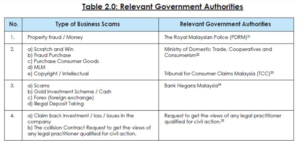Too Good To Be True: How Scams Can Happen
Protect your wallet. Also protect your rights.
With the rise of online transactions, especially on rapidly evolving digital platforms like those in Malaysia, the term “scam” is no longer unfamiliar to consumers. Scams are deceptive schemes designed to trick individuals into surrendering money, personal information, or valuable assets. From investment fraud and phishing attacks to employment scams and love scams, these illegal activities cause financial losses totalling billions of Ringgit annually. In 2024, Malaysia reportedly lost RM54.02 billion; equivalent to 3% of the nation’s GDP to scams (Source: Penang Institute). The reality is that such illegal transactions often move unchecked throughout the region. As scams evolve, fraudsters have developed more sophisticated and “leakproof” methods, making their schemes increasingly pervasive and difficult to detect, thus reducing the chances of being caught.
How scams work?
Traditionally, scams involved physical interactions or mailed letters, but today, scammers employ various online platforms such as social media, fake websites, emails, QR code and even phone calls to reach a wider audience quickly and anonymously. We can also found scammers use sophisticated techniques such as end-to-end encrypted messaging, AI-generated deepfake identities, cryptocurrency laundering, and multi-layered proxy servers to evade detection.
The Red Flags to Detect!
Despite the varied nature of scams, we as consumers shall alert for certain red flags to potential fraud. Even though scams exist in many forms, but those red flags could be obvious for all tactic and their scam play; which includes unsolicited calls or messages demanding your personal details, pressuring tactics urging immediate action or payment, offers that seem too good to be true, requests to transfer money to unknown accounts, poorly written messages and suspicious contact details as well as suspicious editing on marketing poster.
Modus Operandi
Mostly, scammer is likely to succeed when they exploit basic human psychology and social vulnerabilities; things that us as a human aware of how fragile it is. But most importantly, the lack of awareness remains a significant factor as to why many people are simply unaware of how scams operate or fail to recognize warning signs. CelcomDigi’s inaugural National Scam Awareness Survey 2024 report provides Malaysians’ awareness of the National Scam Response Centre (NSRC) 997 hotline for reporting scams. It revealed that 64% of respondents were unaware of this reporting channel. Awareness was particularly low among those facing financial difficulties, with 67% of individuals struggling to meet monthly expenses unaware of the NSRC hotline as a resource for scam reporting. Among 10,893 respondents nationwide, 87% reported increased scam awareness over the past year and could clearly describe their experiences. They recognized that sharing personal data poses risks and that clicking unverified links is dangerous. The survey showed that 73% are aware of social sharing risks, 65% verify links before clicking, and 52% filter personal data before sharing.
Protecting your wallet
To protect ourselves against fraudulent scams, consumers should be more cautious when performing any online or offline transactions. Verifying the identity of anyone requesting personal or financial information is crucial, as is never sharing passwords, PINs, or one-time passwords. Avoid clicking on suspicious links or downloading attachments from unknown sources. When in doubt, always use official websites to confirm the legitimacy of transaction. Other than that, it’s important being skeptical of unsolicited investment opportunities or job offers. Lastly, any suspected scams should be promptly reported to the Malaysian Communications and Multimedia Commission (MCMC) or the police.
Accordingly, victims of scams may seek assistance from the relevant authorities. Table 2.0 below provides a clear breakdown of the different types of scams and the corresponding authorities to approach.

In conclusion, while scams continue to grow in sophistication and reach, we can reduce their risk by staying informed and vigilant. Understanding the tactics scammers use and recognizing red flags are key steps toward protecting yourself. Should you fall victim to a scam, seeking legal advice early can help you explore possible remedies and protect your rights, or contact us by phone at 07-2356306 or email us at office@veerco.net


